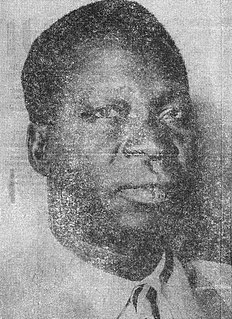The Republic of Benin was formed in 1960 when the colony of French Dahomey gained independence from France. Prior to this, the area that is now the Republic of Benin was divided largely between two coastal kingdoms, Dahomey and Porto-Novo, and a large area of various tribes in the north. The French assembled these various groups together into the colony of French Dahomey, which was part of the various colonies of French West Africa from 1904 until 1960. In the independence era, the republic was extremely unstable for the first decade and a half of existence, with multiple governments and multiple military coups. In 1972, Mathieu Kérékou led a military coup deposing the Presidential Council and appointing himself as the head of state, a position he held until 1991 when the country returned to multiparty elections. Since that point, the state has held multiple presidential and legislative elections and a number of different parties have become important.

Sourou-Migan Marcellin Joseph Apithy was a Beninese political figure most active when his country was known as Dahomey. He arose on a political scene where one's power was dictated by what region in Dahomey one lived in.

Coutoucou Hubert Maga was a politician from Dahomey. He arose on a political scene where one's power was dictated by what region in Dahomey one lived in. Born a peasant in 1916, Maga served as a schoolmaster from 1936 to 1945, during which time he gradually gained considerable influence among the uneducated. He was elected to Dahomey's territorial assembly in 1947 and founded the Northern Ethnical Group, later renamed the Dahomey Democratic Rally. In 1951, Maga was elected to the French National Assembly, where he served in various positions, including premier from 1959 to 1960. When Dahomey gained its independence from France on August 1, 1960, Maga was appointed to the presidency, and was officially elected to that post on December 11.

Elections in Benin take place within the framework of a multi-party democracy and a presidential system. Both the President and the National Assembly are directly elected by voters, with elections organised by the Autonomous National Electoral Commission (CENA).

Legislative elections were held in the Republic of Dahomey on 2 April 1959. Although the Dahomeyan Democratic Union (UDD) received the most votes, they won the fewest seats. The Republican Party of Dahomey (PRD), which came second in terms of votes, won 37 of the 70 seats in the Legislative Assembly. Following the election the PRD and UDD agreed to split the seats in one constituency, with the PRD losing nine seats and the UDD gaining nine seats.

Tahirou Congacou was a Beninese politician, most active during the 1960s, when his country was known as Dahomey. He served as speaker of the National Assembly from 1964 to 1965, and in that capacity served as acting President of Benin from 29 November 1965 to 22 December 1965. He also served as acting foreign minister during 1965.
Assogba Oké was a Beninese politician and diplomat, mostly active when his country was known as Dahomey. Replacing Chabi Mama, Oké became Foreign Minister in 1960, lasting until 1962.
The 1963 Dahomeyan coup d'état was staged on October 28, 1963, by Christophe Soglo, who took control of the Republic of Dahomey to prevent a civil war. He overthrew Hubert Maga, whose presidency faced extreme economic stagnation and a host of other problems.
Paul Darboux was a Beninese merchant and politician, most active when his country was known as Dahomey.
Édouard Dunglas (1891–1952) was a French physician, historian, geographer, and politician who spent a majority of his life in Dahomey.

Elections for the Territorial Assembly were held in French Dahomey on 30 March 1952. Sourou-Migan Apithy's Republican Party of Dahomey won 19 of the 32 second college seats. Only ten members of the Legislative Council elected in 1947 were re-elected.

Elections to the French National Assembly were held in French Dahomey on 2 January 1956. The territory elected two seats to the Assembly, which were won by Sourou-Migan Apithy of the Republican Party of Dahomey and Hubert Maga of the Ethnic Group of the North. Voter turnout was 47.4%.

Elections to the French National Assembly were held in French Dahomey and French Togoland on 21 October 1945. The territory elected two seats to the Assembly via two electoral colleges. French missionary Francis Aupiais of the Popular Republican Movement was elected from the first college and Sourou-Migan Apithy in the second, but Aupiais died before taking office.

The Dahomeyean Progressive Union was a political party in Dahomey.

The Dahomeyan Democratic Movement was a political party in French Dahomey.

The Dahomeyan Democratic Union was a political party in French Dahomey.

The Union of Independents of Dahomey was a political party in French Dahomey led by Paul Darboux.
Paul Hazoumé was a Beninese writer, educator, ethnologist, and politician.





